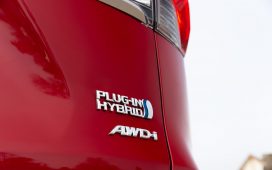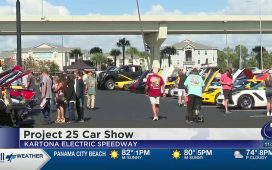Expect November to be packed with headlines about the presidential election—and record-breaking electric vehicle sales. With a nail-bitingly close race, reports suggest that car buyers are holding back on major life decisions. Many are waiting for the election outcome before driving home a new set of wheels. But Hyundai and Kia seem to have bucked that trend, reporting record October sales fueled by all-electric and hybrid models.
Welcome back to Critical Materials, your daily round-up of news and events shaping the world of electric cars, software-defined vehicles and autonomous tech.
Also on today’s dance card: Toyota has partnered with Nippon Telegraph and Telephone Corporation (NTT) in Japan to use artificial intelligence and automated driving systems to reduce road accidents. It sounds like Tesla‘s approach is catching on. And while the Japanese automaker prepares for an automated future, its current sales aren’t looking all that great. Toyota reported a big drop in its global vehicle production for the first time in four years. Keep reading to find out why that happened.
30%: Electric And Hybrid Hyundai And Kia Models Are Having A Moment

Both Hyundai and Kia have some momentum going into the final quarter of the year, unfazed by the turbulent and chaotic presidential election season where the auto industry, and electric vehicles specifically, have endured sustained vitriol for no good reason.
Hyundai said its overall auto sales in October increased 18% to 71,802 units, whereas Kia sales increased 16% to 68,908. Hyundai said models like the Ioniq 5, Santa Fe Hybrid and Tucson Hybrid helped it achieve these record numbers.
Ioniq 5 sales were up 51%, with Hyundai delivering 4,498 units in October. Unfortunately Ioniq 6 sales experienced a sharp drop of 32%, with only 837 units sold. That’s a shame because the Ioniq 6, at least to this pair of eyes, is one of the best-looking cars on the market. And it’s no slouch when it comes to range and performance. It just happens to be a sedan in an SUV-dominated world. (Don’t tell the Toyota Corolla I said that.)
Speaking of SUVs, Santa Fe Hybrid sales were up 136% and Tucson Hybrid sales grew 140%.
Here’s what Randy Parker, the CEO of Hyundai Motor America, said in a press release:
Hyundai has set a total sales record in the month of October for the third consecutive year. The Santa Fe HEV, Tucson HEV and IONIQ 5 led the way, showcasing strong demand for our electrified vehicles that offer cutting-edge technology and exceptional design.
For Kia, the Sportage, Carnival and EV6 all posted record October sales. EV6 sales increased 12% to 1,732 units. The EV6’s bigger three-row electric sibling outperformed it. Kia sold nearly 2,000 units of the EV9, which has received rave reviews and is in a league of its own at the moment, especially in the $50,000-$70,000 price bracket.
We’ll see if that momentum holds past November 5. If you’re an EV fan, buckle up. The next few days could either lift your spirits to new highs, or they could be a total letdown.
A win for Republican presidential candidate Donald Trump might signal a rough road ahead for EVs—he’s vowed to roll back the pro-EV policies that have helped companies like Hyundai and Kia hit record sales. But things could improve if Vice President Harris wins the race—she is expected to continue (or even expand) Biden’s pro-EV policies.
Either way, it’s going to be a nail-biting week. If you want to know how it’ll affect the auto market, keep reading InsideEVs.
60%: Toyota Wants To Use AI To Reduce Accidents

Toyota’s latest press release has buzzwords like “AI platforms,” “data centers” and “compute resources.” Sound familiar? That’s because—and I hate to say it—Toyota is going the Tesla way in automating its future cars.
I get it. Data is the new oil and you can hardly blame automakers these days for jumping on that bandwagon.
Toyota said on Thursday that it was partnering with telecommunications giant Nippon Telegraph and Telephone Corporation (NTT) to develop automated driving tech. Just like Volvo, Tesla and so many others, Toyota said it will build software-defined cars (SDVs) to reduce road accidents.

To achieve that, Toyota and NTT will develop what they call a “Mobility AI Platform” with an investment of $3.3 billion by 2030. The initiative includes the “development of advanced driving support/future automated driving systems that are data-driven, with AI learning on its own based on large amounts of driving data,” Toyota said.
This news comes as Toyota’s rivals in China and other parts of the world are surging ahead with EV sales and autonomous vehicle testing. Toyota remains the world’s largest automaker by sales volume, and it’s preparing for an electrified future with huge investments in batteries and new EV models. But much of those plans are yet to materialize.
That’s now reflected in its global sales and production.
90%: Toyota’s Global Production Drops For The First Time In Four Years

Toyota’s global production fell by 7% between April and September, marking its first drop in nearly half a decade. Local reports from Japan suggest that a quality scandal and burgeoning competition in China are putting pressure on Toyota’s domestic and overseas sales.
Toyota manufactured 4.71 million vehicles in the first half of fiscal year 2024, down from 5.04 million vehicles produced during the same period last year. Its production dropped by 17.1% in China where BYD and other local automakers continue to dominate with affordable EVs and PHEVs. Its volumes in North America fell 1.7% whereas Europe saw small growth of 3.2%.
Its global EV sales increased 32.5% to 78,178 units in the six-month period, so that’s a strong indicator of where things are going. And Toyota and Lexus don’t offer truly competitive electric SUVs in the U.S. yet. That’s set to change in the next couple of years. So I’m not counting them out. Not yet, at least.
100%: Will A Trump Victory Hurt EV Sales?

Photo by: InsideEVs
Hyundai and Kia posted record auto sales in October. That’s despite many buyers holding back on purchases. Do you think a Trump victory next week could weaken the strong momentum EVs have at the moment?
We reported yesterday that it will be hard for Trump to fully repeal the Inflation Reduction Act, which has supercharged EV sales and production in the U.S. However, the IRA funds that have not yet gone out the door could be jeopardized. Leave your thoughts in the comments.
Have a tip? Contact the author: suvrat.kothari@insideevs.com








